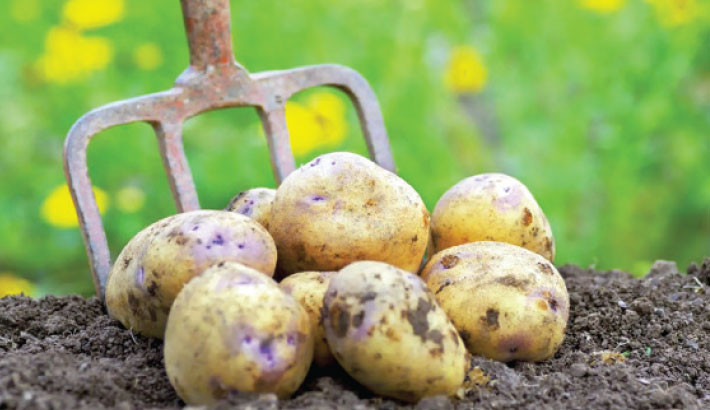Bumper potato harvest in Jashore rekindles farmers’ hope
Amanur Aman, Kushtia
Published: 13 Mar 2025

Representative Image
Widely known as a thriving vegetable-producing hub, the south-western district of Jashore in Bangladesh is experiencing a remarkable boost in potato yield this year.
That’s not all—farmers are also celebrating a breakthrough in seed potato production, marking a promising shift for the region’s agricultural future.
At the start of the season, challenges loomed large. Agricultural officials recall how relentless bouts of rainfall wreaked havoc on vegetable crops, leaving farmers grappling with losses.
However, as the season progressed, hope was rekindled with a strong turnaround in potato cultivation.
According to the Department of Agricultural Extension in Jashore, potatoes have been cultivated across 1,550 hectares of land spanning eight upazilas this year, targeting an impressive production of 36,377 tonnes.
This marks a slight increase from last year’s 1,500 hectares, reflecting farmers’ growing confidence in the crop.
And the hard work is paying off. Farmers report a bountiful harvest, with yields soaring. Where last year’s average stood at 85-90 maunds per bigha (33 decimals), this year’s yield has jumped to as much as 100 maunds per bigha—a significant leap in productivity.
For local farmer Ruhul Kuddus Saleh of Kodalia village, the success is evident. Cultivating potatoes on 50 decimals of land, he managed to achieve a remarkable 100 maunds per bigha.
However, amidst the celebration, concerns linger over market prices. “Last year, around this time, we sold potatoes at a wholesale rate of Tk28-30 per kg. This year, we are getting only Tk19-20 per kg,” he lamented.
While the price dip is disheartening, Saleh finds solace in the increased yield, which helps cushion production costs.
Yet, the cost of cultivation is a growing concern. Rising expenses for seeds, fertilisers, pesticides, land preparation, irrigation, and labour are straining farmers’ budgets. Even so, optimism prevails, as the high yield keeps their spirits buoyant.
Samaren Biswas, additional deputy director of the Jashore Agricultural Extension Department, attributes this year’s success to favourable weather conditions. “Despite slightly lower prices, the high yield ensures that farmers are not incurring losses,” he reassured.
But Jashore’s farming community isn’t just excelling in regular potato production; they are making remarkable strides in seed potato farming—a crucial development for sustaining future harvests.
Over 300 farmers in the district are now engaged in seed potato production, working in collaboration with the Bangladesh Agricultural Development Corporation (BADC).
Their collective efforts have yielded an impressive 1,000 tonnes of seed potatoes this year, a significant contribution towards securing next year’s supply.
Beyond BADC, private companies and individual farmers are also stepping up to preserve seed potatoes, further strengthening the sector.
Badrul Alam, a farmer from Nongorpur village in Sadar Upazila, exemplifies this shift. Cultivating potatoes on seven bighas of land, he successfully supplied 220 sacks—each weighing 50kg—of seed potatoes to BADC storage facilities.
Like Alam, 90 farmers from villages including Nongorpur and Kodalia are under contract with BADC for seed potato production, ensuring a steady supply of high-quality seeds for the coming season.
BADC (Seed) Deputy Director in Jashore, Hafizur Rahman, confirmed that after the collection process concludes, a committee will determine market prices and set purchase rates accordingly.
Despite the rising costs of production—estimated at Tk40,000–45,000 per bigha—farmers remain hopeful. The silver lining? Seed potatoes fetch Tk8 to Tk10 more per kg compared to regular potatoes, translating into a net profit of Tk30,000–35,000 per bigha.

